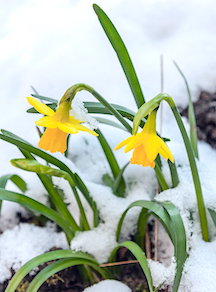By Ruth Johnson
After a long, hard winter, spring is finally starting to come back. While it would be desirable to quickly leave behind the chilly memories, lessons can be taken from the experience, especially for higher education. This past year, schools and universities have often had to close for days at a time, ensuring that parents and children are stuck at home, and college students are stuck in university dorms.
When it comes to cancelling classes, each university has its policies. Some schools, such as the University of Michigan at Ann Arbor, make a point of not cancelling classes, citing their mostly all-residential student body as the answer. Indeed, before this winter, Ann Arbor had not cancelled classes since 1978. That time, it was because of the snow—this time, it was because of the subzero temperatures, making it unsafe for even residential students to be out and about.
At other schools, such as Rose-Hulman Institute of Technology in Terre Haute, Indiana, which operates on the quarter system, the polar vortex in particular interfered with students returning back to school after their winter break. Concerned parents and students complained about safety and travel issues, and the school reversed an earlier decision to hold classes. Because this all occurred in the middle of an academic session, classes had to be rearranged and assignments rescheduled. More recently, the South was hit with a severe winter storm, completely shutting down transportation and life in general in the region. There too, schools such as Auburn University in Alabama and Emory, Georgia Tech and Agnes Scott in Georgia closed for days.
Most college and university closings have generally been ignored, simply considered another casualty of the severe weather. Discussions do not really revolve around the consequences or lack thereof of closures—with one notable exception: at the University of Illinois at Urbana-Champaign, Chancellor Phyllis Wise made the decision not to close the university. In turn, a small group of students took to Twitter to lash out, specifically at the chancellor, dealing in racial and sexist epithets. Wise noted in an editorial with Inside Higher Ed the truly horrifying aspect of the attacks—what if the hate had been “directed at a vulnerable member” of the university’s community. She encouraged her community to take the situation as an opportunity to promote a diverse discourse that was not offensive, but still “robust–an even intense.”
So, while the wintry weather has allowed the educational community to consider the consequences and different aspects of furious debates held on campuses, specifically on social media, very little consideration has been made towards the consequences of actually shutting down an entire university or college for a few days. Ann Arbor has a cheeky myth that a law school student, distraught by the idea of losing money due to a snow day, sued the school for damages. Throughout the country during the winter, concerned discussions are held about the amount of snow days that occur for elementary, middle and high school, typically focused on the disturbance that happens to the regular schedule of learning.
Recently, Joshua S. Goodman (ΦBK, Harvard, 2000), a former school teacher and current assistant professor in public policy at the Harvard Kennedy School released his findings that snow days are actually a good thing for schools. He writes in his study “Flaking Out: Snowfall, Disruptions of Instructional Time, and Student Achievement,” that “With slack time in the schedule, the time lost to closure can be regained. Student absences, however, force teachers to expend time getting students on the same page as their classmates.” Closing schools can benefit the progress of classrooms, he finds, because keeping a school open would exclude students who could not make it to school during dangerous weather conditions.
Arguably, the same conclusion can be extended to colleges and universities. Not only will students, residential or commuter, likely not attend classes, citing poor conditions, faculty, having to deal with a potentially dangerous commute would probably just cancel classes anyway. But just “go ahead and cancel classes” seems like a poor, simplistic lesson to be learned from the winter. Perhaps the lesson should be that leeway needs to be considered in syllabi, especially as conditions get harsher—perhaps alternative means of class meetings—such as Google Hangouts, should be considered. Finally, provisions must be made for faculty and staff at institutions that must be closed as well. Students still have to be cared for, and this winter, many risked their lives to ensure that students remained fed and warm. Contingency must be the lesson learned in all of this, so higher education, much like the rest of the nation, cannot be caught unawares by winter yet again.
Ruth Johnson is a junior at Agnes Scott College studying theatre and political science. Agnes Scott is home to the Beta of Georgia Chapter of Phi Beta Kappa.




